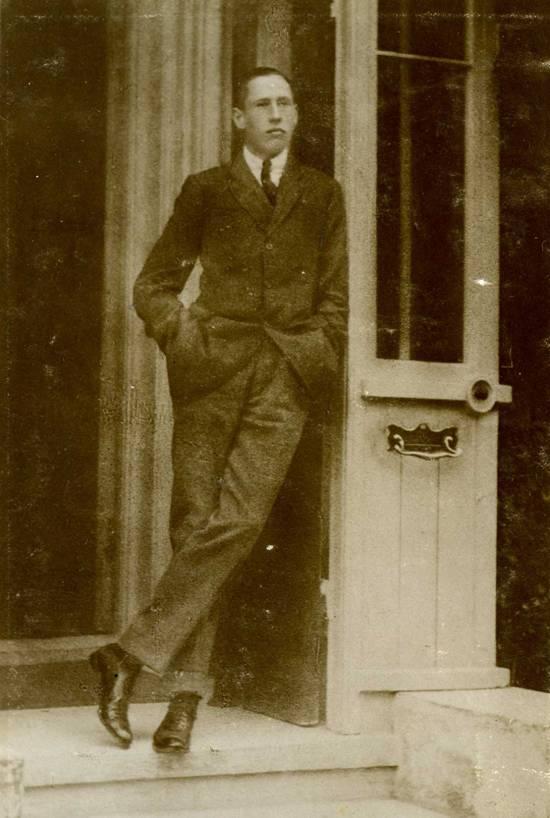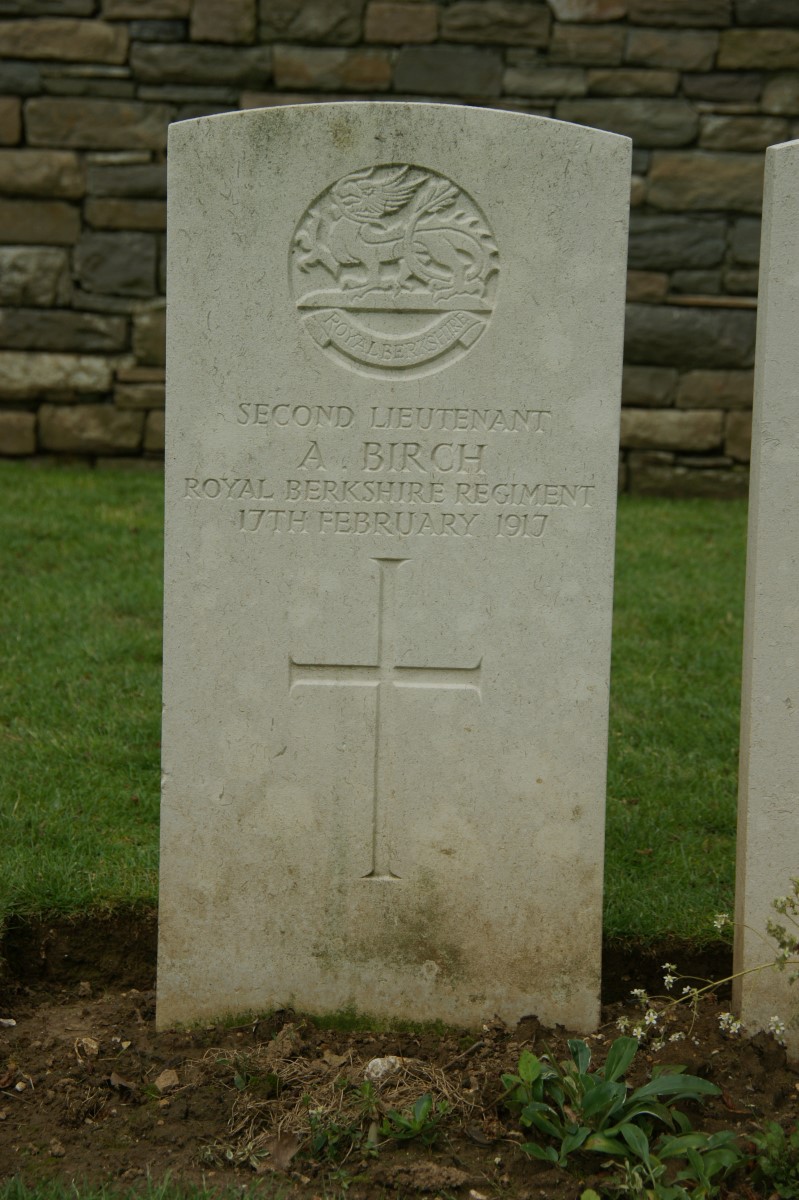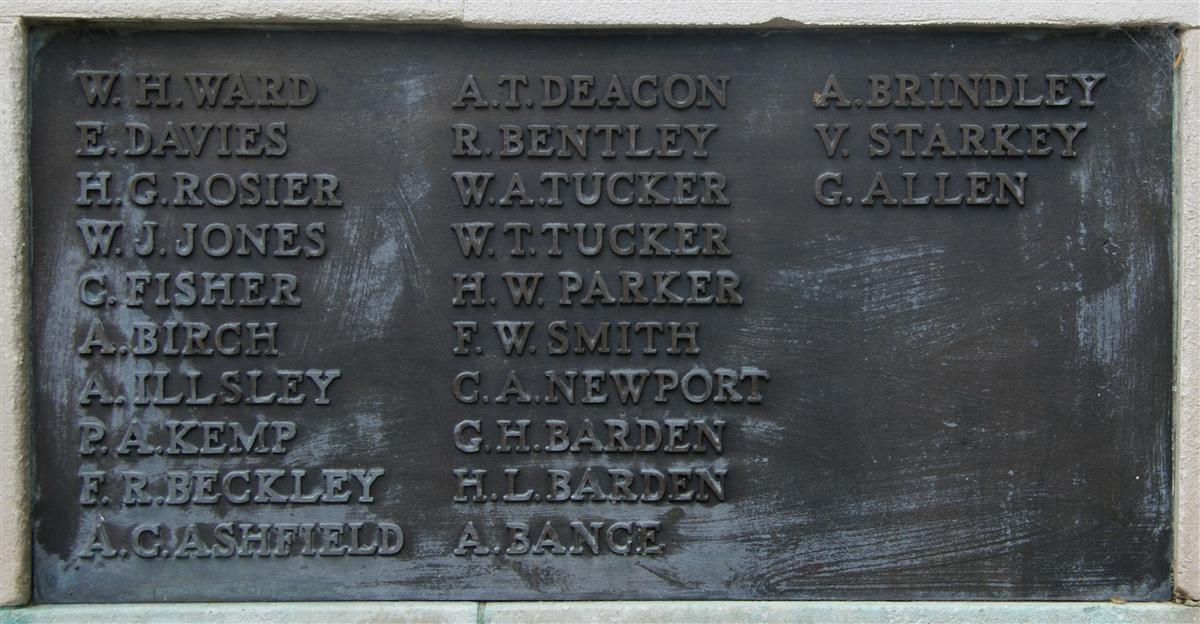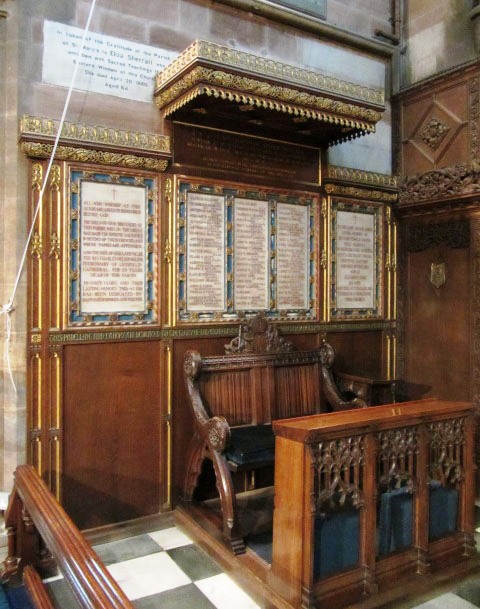Arthur Birch
2nd Lieutenant Arthur Birch, 6th Battalion Royal Berkshire Regiment

Arthur Birch - as pictured in his school's Roll of Honour book. (c) King's School, Bruton |
Arthur was born on 24 October 1891, the fourth and youngest son of Dr Robert Birch and his wife Gertrude (née Somerset). His father was a doctor, born in Litchfield, Staffordshire in 1851, who came to Newbury in the 1870s to set up in practice as a surgeon. By 1878 he was operating from an address in Bridge Street, but had moved from there to Marsh House by 1883. In 1882 Robert married Gertrude Somerset, the daughter of Francis Flowers Somerset, proprietor of the Newbury Brewery Company and a notable local figure. In 1888 they moved to The Litten, formerly Newbury Grammar School, where they remained until Robert’s death in 1908. Following this tragic event Gertrude moved away from Newbury, back to her home town, to 4 Avenue Road, Harrow. By the time of the 1911 census the only children still at home were Arthur and his sister Janet.
Arthur was educated at King’s School in Bruton, Somerset, and trained as a solicitor’s clerk finding employment with the Bank of England.
On 3 December 1912 he signed up with the Artists’ Rifles (regimental number 1133), a Territorial battalion within the London Regiment. Their official designation was the 1/28th (County of London) Battalion (Artist's Rifles). He continued as a clerk and part time soldier until 1914 when he was mobilised and embodied as a Private on 5 August, the day after war was declared. The battalion was attached to the 2nd London Division for a few weeks before being detached from the Division and moved to Bailleul in France as an Officer Training Corps. This role reflected the make-up of the Battalion whose rank and file members were largely public school educated middle class lads - prime officer material.
Arthur remained with the Artists’ Rifles until September 1916 rising to the rank of Sergeant. Many of his contemporaries will have been commissioned long before this, but he twice turned down a commission, determined to learn more in the ranks before taking the step up. On 22 September 1916 he applied for a commission with the Royal Berkshire Regiment. Two months later, on 23 November, he joined C Company of the 6th Battalion Royal Berkshire Regiment in the field as a 2nd Lieutenant.
War Diary, 6th Royal Berks – 23 November 1916
France, Harponville: Bn marched to Doullens starting at 11.15am and arriving at 2pm. Billeted in underground rooms and passages in citadel: officers in No 3 Canadian Hospital. 2/Lt J N Richardson and 2/Lt A J Fox [another Newbury lad] rejoined Bn from No 46 IBD, 2/Lts A Birch, P Murray & H G N Tarrant joined from GHQ Cadet school. Draft of 4 OR joined. Capt N B Hudson went to 18th Div School at Ouville as an instructor.
Over the ensuing months Arthur settled into the role of platoon commander in a frontline unit during a very quiet time for the battalion, spending his first stint as an officer in the front line for a few quiet days from 28 January to 2 February 1917. A couple of weeks later the battalion was involved in what is known in the official history of the war as The Actions of Miraumont, but is often referred to as the Battle of Boom Ravine. This was one of a series of offensive actions in the early months of 1917 as the Allies kept up the pressure on the Germans; it can be viewed as a late element of the Battle of the Somme or precursor to the Battle of Arras. The three Divisions of II Corps, the 2nd, 18th and 63rd were detailed to attack German positions to the south and west of the village of Miraumont with the aim of capturing high ground overlooking the village. The idea was that this would force the Germans to withdraw from the village, which in turn would render their positions at Serre untenable. Unknown to the Allied High Command the Germans had decided a few days earlier to withdraw to new defensive positions (the Hindenburg Line) some miles to the east; at best this action did no more than accelerate this withdrawal.
The 6th Royal Berks were in 53rd Brigade in the 18th Division as were the 8th Suffolks. The two battalions were tasked with an attack up either side of what remained of a back road leading from Miraumont towards Pozières. The attack was north north east towards the western end of the sunken roads that gave their name to the battle – Boom Ravine.
C Company of the 6th Royal Berks was immediately to the west of the road and began its advance at zero hour (5.45am on 17 February 1917) behind a rolling barrage from the artillery. However, before this the Germans, who are believed to have been warned of the attack by a British deserter, heavily shelled areas where the attacking forces were likely to assemble. Several battalions, including the 6th Royal Berks suffered heavy casualties at this point. Arthur made it to the start point and led his platoon forward towards a defended position known as Coffee Trench. Unfortunately the British artillery barrage had failed to properly cut the German barbed wire in front of the trench holding up C Company’s advance. The German artillery was still in action and Arthur was hit by shrapnel before his Company made it through the wire and captured the position. The battalion war diary states that he was wounded at 6am, 15 minutes after zero hour. At much the same time his fellow Newburian, 2nd Lieut Andrew Fox, was also wounded. For more about this action read John Chapman’s account here.

Arthur's grave in Blighty Valley Cemetery. |
Arthur died that same day, though his mother was informed first of his wounding, receiving a telegram to that effect on 20 February. Eight days later the news arrived of his death through another telegram: Deeply regret to inform you 2 Lieut A Birch Royal Berkshire Regiment previously reported wounded February Seventeenth is now reported to have died of wounds February Seventeenth. The Army Council express their sympathy.
The news was reported in Newbury:
Newbury Weekly News, 1 March 1917 – Local War Notes
Second-Lieutenant A Birch, of the Royal Berks Regiment, youngest son of the late Dr Robert Birch of 4, Kenton Avenue, Harrow, has been killed in action. The young officer was a clerk in the Bank of England, and went out early in the war with the Artists’ Battalion. He had been slightly wounded, and was only recently gazetted to the Royal Berks.
Two weeks later more details were supplied:
Newbury Weekly News, 15 March 1917 – Local War Notes
Further particulars are to hand concerning the death of Second Lieutenant Arthur Birch, Royal Berkshire Regiment, who was killed in action on February 17th, fourth and youngest son of the late Robert Birch, MRCS, LRCP, of Newbury, and Mrs Birch, 4, Kenton Avenue, Harrow. Mr Birch joined the Artists’ Rifles in 1912, and was in camp with them at the outbreak of war. Towards the end of 1914 Mr Birch went to France with his battalion, and although twice offered a commission, preferred to go through the full training and when he received his commission in the Royal Berkshire Regiment in November 1916, he was a sergeant. A friend and brother officer, in a letter, says:- “He was hit by a German shell about 15 minutes after the attack started. He was well in front of his men, leading them on, and it was largely due to his gallantry that the men behind him did so well. It has been my pleasure to know him intimately since the days when he was in the ‘Artists,’ and have always found him to be a most charming officer in every way. In this battalion as an officer he was very popular in the mess, and well loved by all his men. He is a great loss to the battalion, and as my friend I find a great gap now he is gone.” From one of his men:- “At the time of his death he was leading his men in an attack. He was struck by a piece of shrapnel, and passed away four minutes later. He was perfectly conscious until the last, and did not suffer much pain. He was a brave officer, and deeply loved by is men. In closing I wish to send you the condolences of all the NCOs and men of his company in your great loss.”

King's Bruton Memorial Hall and Arthur's name on the wall inside. (c) King's School, Bruton |
The report of his death four minutes after being struck by the shrapnel is almost certainly a fabrication designed to reassure his relatives that his end was quick; the war diary records him as being hit at 6am and died since. He must have survived for some time for the diary to make this distinction.

Arthur's name on Newbury War Memorial (left middle) |
He was buried in Quarry Post Cemetery in Authuille Wood a few miles south of the Boom Ravine. After the was this was one of the many cemeteries that was closed; the men buried there were transferred to Blighty Valley Cemetery, also in Authuille Wood. Arthur lies there in grave III.L.1.
Locally he is remembered only on the Newbury Town War Memorial (Tablet 6). His school, also known simply as King’s Bruton, erected a school hall as a memorial to the old boys who died serving their country in the Great War. Arthur’s name is inscribed in the panelling within the hall.

Memorial in St Mary's, Lichfield. (Berenice Baynham) |
He is also remembered on a memorial in St Mary's Church, Lichfield - his father's home town. It is suspected that an aunt of Arthur's was a parishioner at this church.
Given their age it is very likely that all of Arthur’s brothers Frank, Harold and William would have served in some form during the war, but only William stands out in the records thanks to his unusual middle name of Somerset.
Having followed his father’s profession as a surgeon he served as a Captain in the Royal Army Medical Corps. In 1917 he earned the award of a Military Cross, gazetted 16 October 1917. The Newbury paper reported the circumstances of this award:
Newbury Weekly News, 21 March 1918 – Local War Notes
A recent number of the Times contains reference to Capt W S Birch, RAMC, Special Reserve, who thus receives recognition for eminent and distinguished service, as follows: For 72 hours he worked with the stretcher bearers of his field ambulance, and collected the wounded under continuous fire. By his cheerfulness and disregard of danger, he set a splendid example to all his bearers. Capt Birch was the third son of the late Dr Birch of Newbury.
Arthur’s cousins, Frank and Burchall Somerset, sons of Gertrude Birch’s brother Henry Somerset, are also remembered on the Newbury Town War Memorial. Although both were born in Newbury Frank died serving in the South African Infantry while Burchall died serving in the Canadian Expeditionary Force.
Bibliography
Boom Ravine: Pigeon, Trevor: Leo Cooper, Pen & Sword Books, 1998, ISBN:0850526124
Official History of the War, Military Operations France and Belgium 1917 Vol 1 pp73-82
The Royal Berkshire Regiment (Princess Charlotte of Wales’s) 1914-1918; Petrie, F Lorraine; Facsimile reprint - The Naval & Military Press , ISBN:1847349757 pp267-270
The Biscuit Boys - Winter 1916/17 - 6th Battalion; Chapman, John; www.purley.eu/H142P/P246-Int2.pdfWar Diary, 6th Battalion Royal Berkshire Regiment; unpublished manuscript; PRO:WO 95/2037/1
Special thanks to Andrew Leach, Archivist at King's School Bruton for the pictures.

Find a memorial :
| Died this day: | |
| 02 March 1918 | |
| N G Burgess | |
| Newbury |

Like this site? Show your appreciation through a donation to a great charity.